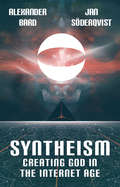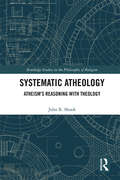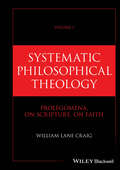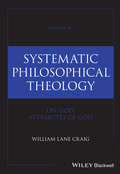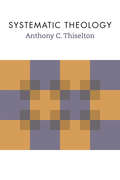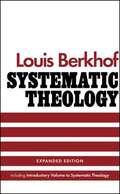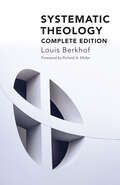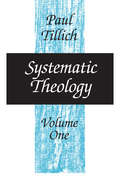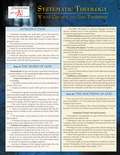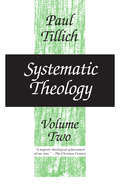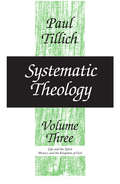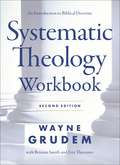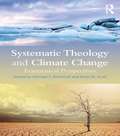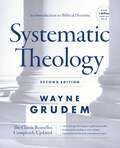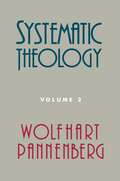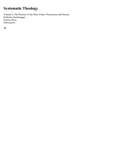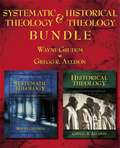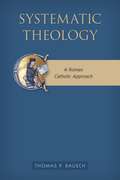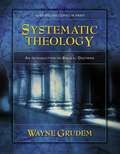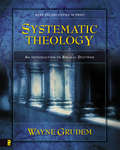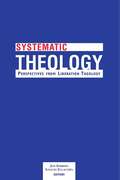- Table View
- List View
Syntheism - Creating God in the Internet Age
by Alexander Bard Jan SöderqvistA NEW REVOLUTIONARY VIEW OF THE FUTURE FROM THE AUTHORS OF THE INTERNATIONAL BESTSELLER THE FUTURICA TRILOGY This book has the audacity to describe individualism as a religion and to depict reality as being primarily virtual rather than physical. Though the authors rattle the reader's perception of both the self and the world, their overriding purpose is to induce passive recipients of the future to instead become active participants. Through engaging observations, lucid interpretations and an accessible style, Bard & Söderqvist serve up a challenging analysis of our present and offer inspiring insight into the dramatic twists and turns of our tomorrow. "Bard himself is as fascinating as is his trilogy... The books are eminently readable." - Publishing Perspectives Alexander Bard and Jan Söderqvist are Swedish philosophers and authors of the internationally successful Futurica Trilogy. They lecture the world over about the current global internet revolution. Bard & Söderqvist are regarded as pioneers in the literary genre futurica, where philosophy, social theory and futurology merge. After joining forces in the late 1990's, Bard & Söderqvist argued that the interactive revolution is the most profound and radical of all technological revolutions in history, that it completely transforms society, politics, the economy and the culture, social power structures, the collective world view and the whole concept of being human. They demonstrated the effects of digital dynamics on various levels of a globalized world. They not only made controversial predictions in the early years of the new millennium (and cleverly foresaw both the dot.com crash and September 11), they have since then been proven right in virtually every aspect and even in the most minute of detals. Not only did Bard & Söderqvist foresee revolutionary innovations such as Google, Facebook, Al-Qaida and Wikileaks; they also went deeper and looked into the very power struggle of the on-going revolution itself. Bard & Söderqvist are now back with a new metaphysics for the digital age.
Systematic Atheology: Atheism’s Reasoning with Theology (Routledge Studies in the Philosophy of Religion)
by John R. ShookAtheology is the intellectual effort to understand atheism, defend the reasonableness of unbelief, and support nonbelievers in their encounters with religion. This book presents a historical overview of the development of atheology from ancient thought to the present day. It offers in-depth examinations of four distinctive schools of atheological thought: rationalist atheology, scientific atheology, moral atheology, and civic atheology. John R. Shook shows how a familiarity with atheology’s complex histories, forms, and strategies illuminates the contentious features of today’s atheist and secularist movements, which are just as capable of contesting each other as opposing religion. The result is a book that provides a disciplined and philosophically rigorous examination of atheism’s intellectual strategies for reasoning with theology. Systematic Atheology is an important contribution to the philosophy of religion, religious studies, secular studies, and the sociology and psychology of nonreligion.
Systematic Philosophical Theology, Volume 1: Prolegomena, On Scripture, On Faith
by William Lane Craig“the culmination of an impressive career in philosophy and theology. … Craig’s work will be highly valued and a great achievement, meriting significant attention.” —Charles Taliaferro, Professor Emeritus of Philosophy, St. Olaf College “William Lane Craig’s landmark treatise on systematic philosophical theology is a major contribution to our understanding of the relation of philosophy and Christian doctrine and will be an essential reference point for future discussions. —Alister McGrath, Emeritus Idreos Professor of Science and Religion, Oxford University A transformative journey through Christian doctrine, Volume I: On Scripture, On Faith William Lane Craig’s Systematic Philosophical Theology is a multi-volume explication of Christian doctrine in the classic Protestant tradition of the loci communes as seen through the lens of contemporary analytic philosophy. Uniquely blending the disciplines of biblical theology, historical theology, and analytic theology, these volumes aim to provide readers with a biblical and philosophically coherent articulation of a wide range of Christian doctrines. In the first volume of the series, Prolegomena, On Scripture, On Faith, Craig begins by introducing his conception of systematic philosophical theology, describing how it relates to biblical theology, dogmatics, fundamental theology, apologetics, and especially philosophy of religion. The chapters that follow defend the divine authority of Scripture, address the nature of faith, and discuss the rational justification for Christian faith. Throughout the text, Craig tackles cutting edge philosophical questions that arise naturally from Christian doctrine, such as the compatibility of biblical inspiration and human freedom and whether faith implies belief.
Systematic Philosophical Theology, Volume 2a: On God - Attributes of God
by William Lane Craig“These volumes are chock full of arguments in a way that stands out in this field. . . . This is a remarkable, generational work that will become the resource in philosophical theology.” —J.P. Moreland, Distinguished Professor of Philosophy, Biola University “An enormous undertaking. However, Craig’s past record indicates that he can and will carry it through to completion. Furthermore, his established reputation. . . guarantees that the work will attract wide interest and will have a ready readership.” —William Hasker, Emeritus Professor of Philosophy, Huntington University A transformative journey through Christian doctrine, Volume IIa. On God: Attributes of God William Lane Craig’s Systematic Philosophical Theology is a multi-volume explication of Christian doctrine in the classic Protestant tradition of the loci communes as seen through the lens of contemporary analytic philosophy. Uniquely blending the disciplines of biblical theology, historical theology, and analytic theology, these volumes aim to provide readers with a biblical and philosophically coherent articulation of a wide range of Christian doctrines. Volume II treats the locus On God in two parts. The first part, Volume IIa. Attributes of God, explores the coherence of theism. Conceiving of God as an infinite and personal being of maximal greatness, Craig carefully defines and explicates the divine attributes of incorporeality, necessity, aseity, simplicity, eternality, omnipresence, omniscience, omnipotence, and goodness. In the second part, Volume IIb. Excursus on Natural theology, The Trinity, Craig examines six arguments for God’s existence, including the argument from contingency, the kalām cosmological argument, the argument from the applicability of mathematics, the argument from cosmic fine-tuning, the moral argument, and the ontological argument, along with the problem of evil. Following the excursus, he transitions to an articulation and defence of Christian theism, formulating a biblical doctrine of the Trinity and offering a model of God as a tripersonal soul.
Systematic Theology
by Anthony C. ThiseltonIn this concise, one-volume systematic theology, celebrated scholar Anthony Thiselton comprehensively covers the spectrum of Christian doctrine with an eye to practical application for Christian discipleship. Written with students and busy ministers in mind, this book is readable and accessible, comprising fifteen chapters of relatively equal length, with each chapter containing five evenly balanced subsections for teaching and learning convenience. Rather than setting out an abstract system, Thiselton explores theology as a living, organic whole. The book thus includes biblical foundations, historical thought, contemporary writers, and practical implications. Expertly incorporating biblical exegesis, philosophy, conceptual grammar, and hermeneutics, this work is the most succinct multidisciplinary systematic theology available.
Systematic Theology
by Louis BerkhofLouis Berkhof's loyalty to the well-defined lines of the Reformed faith, his concise and compact style and his up-to date treatment have made this work the most important twentieth century compendium of Reformed theology. 'The work seemed particularly important to me', writes the author, 'in view of the widespread doctrinal indifference of the present day, of the resulting superficiality and confusion in the minds of many professing Christians, of the insidious errors that are zealously propagated even from the pulpits, and of the alarming increase of all kinds of sects. If there ever was a time when the church ought to guard her precious heritage, the deposit of the truth that was entrusted to her care, that time is now'. This expanded edition contains Berkhof's Introductory Volume, which was designed to be read together with the Systematic Theology itself.
Systematic Theology
by Louis BerkhofAn enduring theological classic now available in paperbackThis complete edition of Louis Berkhof&’s magnum opus includes both his Introductory Volume to Systematic Theology and his classic Systematic Theology. In his monumental treatment of the doctrines of the Reformed faith, Berkhof covers the full range of theology in traditional systematic fashion, examining the doctrines of God, anthropology, Christology, soteriology, ecclesiology, and eschatology. The result is a comprehensive work written in a scholarly yet simple style.The foreword by Richard A. Muller explains the relation and importance of Berkhof&’s prolegomena to the rest of his systematic theology, while complete indexes, thorough bibliographies, and questions for further study make this edition ideal for students. Since its original publication in 1939, Berkhof&’s Systematic Theology has remained the most influential twentieth-century compendium of Reformed theology.
Systematic Theology
by Paul Tillich&“A great voyage of discovery into a rich and deep, and inclusive...vision and understanding of human life in the presence of the mystery of God.&” -- H. Richard Niebuhr, author of Christ and Culture This is the first part of Paul Tillich's three-volume Systematic Theology, one of the most profound statements of the Christian message ever composed and the summation and definitive presentation of the theology of the most influential and creative American theologian of the twentieth century. In this path-breaking volume Tillich presents the basic method and statement of his system—his famous &“correlation&” of man's deepest questions with theological answers. Here the focus is on the concepts of being and reason. Tillich shows how the quest for revelation is integral to reason itself. In the same way a description of the inner tensions of being leads to the recognition that the quest for God is implied in finite being. Here also Tillich defines his thought in relation to philosophy and the Bible and sets forth his famous doctrine of God as the &“Ground of Being.&” Thus God is understood not as a being existing beside other beings, but as being-itself or the power of being in everything. God cannot be made into an object; religious knowledge is, therefore, necessarily symbolic. &“Beyond doubt the richest, most suggestive, and most challenging philosophical theology our day has produced.&” --John Herman Randall Jr., author of The Making of the Modern Mind
Systematic Theology Laminated Sheet: An Introduction To Biblical Doctrine (Zondervan Get an A! Study Guides)
by Wayne A. Grudem Erik ThoennesZondervan Get an A! Study Guides Trustworthy information, easy access. Six pages packed with critical information provide an ideal study aid for students and a quick, helpful reference for pastors. Information on the sheets comes from Dr. Wayne Grudem’s award-winning Systematic Theology, an introduction with a strong emphasis on the scriptural basis for each doctrine and teaching, clear writing, frequent application to life, and a contemporary approach to subjects of special interest to the church today. No more hunting through textbooks, laboring over self-made study cards, or fumbling with sticky notes. These six pages provide a quick overview of systematic theology in a handy, at-a-glance format. Great for understanding the often complex doctrines, preparing for exams, refreshing your memory, writing papers, or preparing sermons.
Systematic Theology Vol. 2: Existence and the Christ
by Paul TillichIn this volume, the second of his three-volume reinterpretation of Christian theology, Paul Tillich comes to grips with the central idea of his system-the doctrine of the Christ. Man's predicament is described as the state of "estrangement" from himself, from his world, and from the divine ground of his self and his world. This situation drives man to the quest for a new state of things, in which reconciliation and reunion conquer estrangement. This is the quest for the Christ.
Systematic Theology Vol. 3: Life and the Spirit, History and the Kingdom of God
by Paul TillichIn this volume, the third and last of his Systematic Theology, Paul Tillich sets forth his ideas of the meaning of human life, the doctrine of the Spirit and the church, the trinitarian symbols, the relation of history to the Kingdom of God, and the eschatological symbols. He handles this subject matter with powerful conceptual ability and intellectual grace.
Systematic Theology Workbook: Study Questions and Practical Exercises for Learning Biblical Doctrine
by Wayne A. Grudem Erik Thoennes Brianna SmithAn essential resource to support student's learning experience and enhance comprehension of systematic theology.This workbook accompanies the 2nd edition of Wayne Grudem's widely used Systematic Theology. Following the textbook's structure, it features review material and exercises for every chapter, and all major areas of Christian doctrine are covered, including:The Word of GodGodHumanityChrist and the Holy SpiritThe Application of RedemptionThe ChurchThe FutureSections in each workbook chapter include:Opening Prayer: oriented around the content of the chapter to help prepare reader's hearts as they get ready to study and reflect.Chapter Review: questions to help the reader identify and interact with key concepts.Thinking Critically: questions for readers to consider on how the content should influence their beliefs and actions.Personal Engagement: practical application questions that connect theology to daily life.The workbook further maintains the clear writing, friendly tone, and frequent applications to life found in the textbook. Students will benefit from this hands-on engagement with the important teachings in Systematic Theology.
Systematic Theology and Climate Change: Ecumenical Perspectives
by Michael S. Northcott Peter M. ScottThis book offers the first comprehensive systematic theological reflection on arguably the most serious issue facing humanity and other creatures today. Responding to climate change is often left to scientists, policy makers and activists, but what understanding does theology have to offer? In this collection, the authors demonstrate that there is vital cultural and intellectual work for theologians to perform in responding to climate science and in commending a habitable way forward. Written from a range of denominations and traditions yet with ecumenical intent, the authors explore key Christian doctrines and engage with some of the profound issues raised by climate change. Key questions considered include: What may be said about the goodness of creation in the face of anthropogenic climate change? And how does theology handle a projected future without the human? The volume provides students and scholars with fascinating theological insight into the complexity of climate change.
Systematic Theology, Second Edition: An Introduction to Biblical Doctrine
by Wayne A. GrudemThis new edition of Systematic Theology by Wayne Grudem is one of the most important resources for helping you understand Scripture and grow as a Christian.The most widely used resource of the last 25 years in its area, Systematic Theology has been thoroughly revised and expanded for the first time while retaining the features that have made it the standard in its field: clear explanations, an emphasis on each doctrine's scriptural basis, and practical applications to daily life.With nearly 250 pages of new content and revisions, this new edition now includes the following distinctive features:Updated analysis of recent controversies within evangelical theology, including the eternal relationship between the Father and the Son in the Trinity, the role of women in the church, miraculous gifts of the Holy Spirit, and contemporary worship music.New discussion and critiques of recent theological controversies situated outside of traditional evangelical theology, such as open theism, the "new perspective on Paul," Molinism (or "middle knowledge"), "Free Grace" theology, and the preterist view of Christ's second coming.Completely revised chapter on the clarity of Scripture.Completely revised chapter on creation and evolution, including a longer critique of theistic evolution and an extensive discussion on the age of the earth.New discussion of how biblical inerrancy applies to some specific "problem verses" in the Gospels.Additional material explaining evangelical Protestant differences with Roman Catholicism, Protestant liberalism, and Mormonism.Completely updated bibliographies.All Scripture quotations updated from RSV to ESV.Updated section on contemporary worship music.Numerous other updates and corrections.Part of the brilliance of Systematic Theology has been its simplicity and ease of use. Each chapter follows the same structure: discussion of the doctrine being considered, an explanation of that doctrine's biblical support and possible objections, followed by personal application and key terms to know for personal growth. Chapters also include a Scripture memory passage, references to other literature on the topic, and suggested hymns and worship songs.If you think theology is hard to understand or boring, then this new edition of Systematic Theology will change your mind.
Systematic Theology, Volume 2
by Wolfhart PannenbergWidely regarded as the foremost theologian in the world today, Wolfhart Pannenberg here unfolds his long-awaited systematic theology, for which his many previous (primarily methodological) writings have laid the groundwork.Volume 2 of Pannenberg's magnum opus moves beyond the highly touted discussion of systematic prolegomena and theology proper in Volume 1 to commanding, comprehensive statements concerning creation, the nature of man, Christology, and salvation. Throughout, Pannenberg brings to bear the vast command of historical and exegetical knowledge and philosophical argumentation for which he is well known.
Systematic Theology, Volume 2: The Doctrine of the Holy Trinity: Processions and Persons
by Katherine SondereggerKatherine Sonderegger follows her monumental volume on the doctrine of God with this second entry of her Systematic Theology, which explores the doctrine of the Holy Trinity. <p><p>Locating her analysis first in the Hebrew Scriptures, Sonderegger examines the thrice-holy God that is proclaimed to Isaiah in the sanctuary and manifested in the sacrifice of the temple. The book of Leviticus, read in conversation with Exodus, unfolds the doctrine of the Trinity under the character of holiness. In the one God, Trinity speaks of the life, movement, and self-offering of God, who is the eternal procession of goodness and light. In Israel's sacrificial covenant, the triune God is perfect self-offering: the eternal descent of the Father of Lights is the offering who is Son, eternally received and hallowed in the one who is Spirit. Anchoring the theology of the Trinity in Israel's Scriptures in this way elevates the processions over the persons, exploring the mystery of the Divine Life as holy, rational, and good. The Divine Persons, named in the New Testament, cannot be defined but may be glimpsed in the notion of perfection, a complete and perfect infinite set. In all these ways, the Holy Trinity may be praised as the deep reality of the life of God.
Systematic Theology, Volume I: Reason and Revelation, Being and God
by Paul TillichThis is the first part of Paul Tillich's three-volume Systematic Theology, one of the most profound statements of the Christian message ever composed and the summation and definitive presentation of the theology of the most influential and creative American theologian of the twentieth century. In this path-breaking volume Tillich presents the basic method and statement of his system—his famous "correlation" of man's deepest questions with theological answers. Here the focus is on the concepts of being and reason. Tillich shows how the quest for revelation is integral to reason itself. In the same way a description of the inner tensions of being leads to the recognition that the quest for God is implied in finite being. Here also Tillich defines his thought in relation to philosophy and the Bible and sets forth his famous doctrine of God as the "Ground of Being. " Thus God is understood not as a being existing beside other beings, but as being-itself or the power of being in everything. God cannot be made into an object; religious knowledge is, therefore, necessarily symbolic.
Systematic Theology/Historical Theology Bundle
by Wayne A. Grudem Gregg AllisonA collection that includes two of our most exemplary textbooks, Systematic Theology and Historical Theology. The ebook will provide an introduction to Biblical and Christian doctrine.
Systematic Theology: A Roman Catholic Approach
by Thomas P. RauschSystematic theology seeks to understand and render more intelligible the central doctrines of faith and to show how they are related to each other. It tries to demonstrate how these doctrines are rooted in Scripture and develop in the history of the church; most important, it strives to more adequately express and sometimes reinterpret the church’s doctrinal tradition, always in the interest of better communicating the mystery of salvation and bringing it into a dialogue with culture. The present text is intended to be concise and accessible, an introduction that explores basic themes in Catholic systematic theology from a biblical, historical, and contemporary perspective, always aware of today’s theological pluralism.
Systematic Theology: An Introduction To Biblical Doctrine
by Wayne A. GrudemThe Christian church has a long tradition of systematic theology, that is, of studying biblical teaching on centrally important doctrines such as the Word of God, redemption, and Jesus Christ. Wayne Grudem's bestselling Systematic Theology has several distinctive features: A strong emphasis on the scriptural basis for each doctrine Clear writing, with technical terms kept to a minimum A contemporary approach, treating subjects of special interest to the church today A friendly tone, appealing to the emotions and the spirit as well as the intellect Frequent application to life Resources for worship within each chapter Bibliographies in each chapter that cross-reference subjects to a wide range of other systematic theologies.
Systematic Theology: An Introduction to Biblical Doctrine
by Wayne A. GrudemThe Christian church has a long tradition of systematic theology, that is, studying theology and doctrine organized around fairly standard categories such as the Word of God, redemption, and Jesus Christ. This introduction to systematic theology has several distinctive features: - A strong emphasis on the scriptural basis for each doctrine and teaching - Clear writing, with technical terms kept to a minimum - A contemporary approach, treating subjects of special interest to the church today - A friendly tone, appealing to the emotions and the spirit as well as the intellect - Frequent application to life - Resources for worship with each chapter - Bibliographies with each chapter that cross-reference subjects to a wide range of other systematic theologies.
Systematic Theology: An Introduction to Biblical Doctrine
by Wayne A. GrudemThe Christian church has a long tradition of systematic theology, that is, studying theology and doctrine organized around fairly standard categories such as the Word of God, redemption, and Jesus Christ. This introduction to systematic theology has several distinctive features: - A strong emphasis on the scriptural basis for each doctrine and teaching - Clear writing, with technical terms kept to a minimum - A contemporary approach, treating subjects of special interest to the church today - A friendly tone, appealing to the emotions and the spirit as well as the intellect - Frequent application to life - Resources for worship with each chapter - Bibliographies with each chapter that cross-reference subjects to a wide range of other systematic theologies.
Systematic Theology: Life and the Spirit History and the Kingdom of God
by Paul TillichIn this volume, the third and last of his Systematic Theology, Paul Tillich sets forth his ideas of the meaning of human life, the doctrine of the Spirit and the church, the trinitarian symbols, the relation of history to the Kingdom of God, and the eschatological symbols. He handles this subject matter with powerful conceptual ability and intellectual grace. The problem of life is ambiguity. Every process of life has its contrast within itself, thus driving man to the quest for unambiguous life or life under the impact of the Spritual Presence. The Spritual Presence conquers the negativities of religion, culture, and morality, and the symbols anticipating Eternal Life present the answer to the problem of life.
Systematic Theology: Life and the Spirit, History and the Kingdom of God
by Paul TillichIn this volume, the third and last of his Systematic Theology, Paul Tillich sets forth his ideas of the meaning of human life, the doctrine of the Spirit and the church, the trinitarian symbols, the relation of history to the Kingdom of God, and the eschatological symbols. He handles this subject matter with powerful conceptual ability and intellectual grace. The problem of life is ambiguity. Every process of life has its contrast within itself, thus driving man to the quest for unambiguous life or life under the impact of the Spritual Presence. The Spritual Presence conquers the negativities of religion, culture, and morality, and the symbols anticipating Eternal Life present the answer to the problem of life.
Systematic Theology: Perspectives From Liberation Theology
by Jon Sobrino Ignacio EllacuriaDrawn from the landmark reference work Mysterium Liberationis, this book highlights the core themes of systematic theology form the perspective of Latin American liberation theology.
